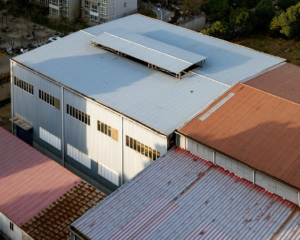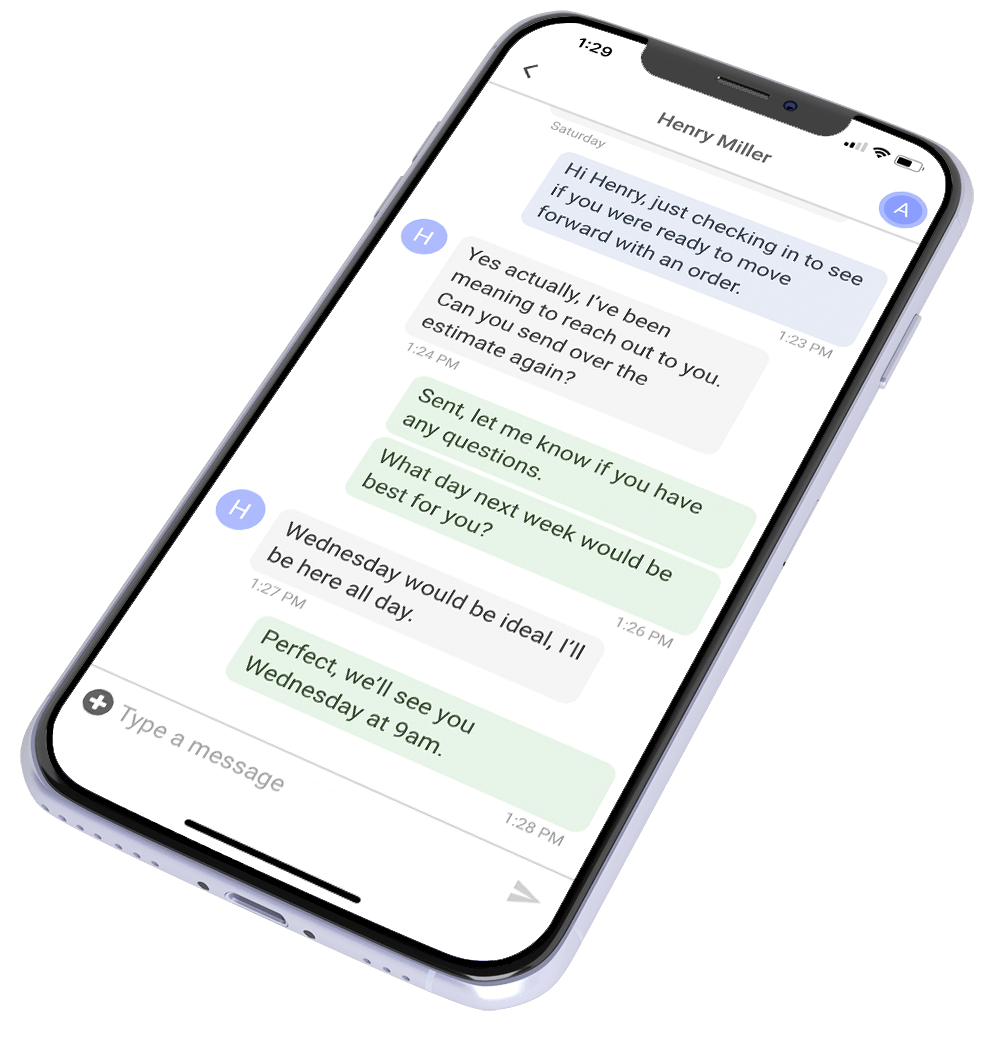Choosing the best CRM for new roofing businesses can make or break your first year.
When you’re starting a roofing business, it feels like chaos. Every part of your reputation rests on your shoulders. You’re juggling a dozen things at once, and if you drop even one, the whole thing feels like it could crash. That’s why almost every successful roofer says the same thing. Starting out is stressful, overwhelming, and not for the faint of heart.
This is exactly why a lot of new roofers decide that using a CRM is a waste of time. They see it as just one more thing pulling them away from what matters. Talking to customers, managing crews, ordering materials, keeping the wheels turning—those feel like the real priorities. And honestly, that thinking makes sense when you’re stuck in the day-to-day.
But a roofing CRM isn’t just another tool. It works like a low-cost assistant who never forgets anything. It takes care of the small stuff, like follow-ups and reminders. It keeps you organized so that the little things don’t turn into big problems. And when you’re doing everything yourself, those mistakes happen more than you think.
You’re not lazy. You’re human. And the job is hard. That’s why we’re writing this article. We’re going to explain what a roofing CRM actually does, whether a new roofing business really needs one, and how to tell the good ones from the bad ones.

What Is a Roofing CRM?
CRM stands for customer relationship manager. It’s a tool built to help you keep track of your leads and your customers. A roofing CRM is just a customer relationship manager made specifically for roofers and the roofing industry. It should give you one place to manage everything. Where new leads come in, where you track inspections, send quotes, schedule jobs, and follow through to production, invoicing, and getting referrals or reviews.
The best roofing CRMs help you at every stage. They organize your pipeline, remind you to follow up, and take some of the weight off your shoulders when it comes to customer communication. You don’t have to manually remember to nudge a lead or chase a payment. It takes care of that for you and frees up your headspace.
Because let’s be honest. If you’re new to roofing, you already know how easy it is to forget the boring but necessary stuff. It’s the follow-ups, the quote reminders, the review requests—those little things that actually drive growth. They’re the first to fall through the cracks when your day gets hijacked by problems.
The truth is, putting out fires feels urgent. And it is. But if you only ever stay in reaction mode, your business stalls out. That’s where a CRM steps in. It keeps your customer relationships cleaner, smoother, and easier to manage so you don’t lose momentum.
Do New Roofing Businesses Need CRM Software?
Every roofer manages customer relationships in some way. It doesn’t matter if you’re a solo operator doing under $500,000 a year or if you’ve got crews in three states and an office in Canada. You already have a system, even if that system is just pen and paper or a Google Sheet. The real question is whether that system actually works. Most of the time, it doesn’t work well for long.
If you rely on your memory, sticky notes, and call logs, you’re not really managing anything. You’re reacting. You move from one missed text to the next forgotten quote. You lose track of details, and those details are how you win jobs and build your reputation. Every roofer needs something that keeps them organized and helps them follow through.
So yes, roofing companies need CRM software. That includes new companies, even if you feel small right now. Unless you run a perfect system by hand, you will eventually hit a wall. Growth brings more customers, more jobs, and more problems to solve. Without a good system, it all starts to fall apart.
That’s why we recommend starting with a CRM early. You can get ahead of the stress while things are still manageable. ProLine even has a free version that’s great for getting started and staying organized. You don’t have to do everything at once, but you do need to take the first step. No matter which CRM you choose, start before the chaos starts running the show.
Now that you know you need one, the next step is figuring out which one to pick. There are a lot of choices out there, and some are better than others. If your budget is tight, you can’t afford to waste time or money on the wrong software. You need something simple, smart, and built for your business. The rest of this article will help you figure out exactly what to look for in a roofing CRM.
Will It Help Me Sell More Roofing Jobs?
The biggest mistake roofers make when choosing a CRM is looking only at the price. They demo a few options, get a ballpark number for each, and then compare the monthly cost. Some are cheap. Others are expensive. It’s easy to say, “I’m just starting out, I need to save money, so I’ll go with the cheapest one.”
That mindset is understandable. When you’re watching every dollar, it feels smart to cut overhead. But there’s a better way to think about it. Instead of asking, “How much does it cost?” ask, “Will this help me make more money?” In other words, will this CRM actually pay for itself and then some?
For example, you might choose a rock-bottom CRM that’s basically a spreadsheet with a logo. Sure, it only costs a few bucks. But what if it doesn’t help you close any more jobs? What if it just adds busywork or slows you down? In that case, you didn’t save money. You lost sales.
Now imagine a more expensive CRM that costs $1,000 a month. That’s a lot when you’re new. But what if using it helps you triple your sales? In one month, it already paid for itself. And it could keep doing that for years.
So here’s the real question to ask yourself. Will this CRM help me close more roofing jobs? That shift in thinking—from cutting costs to getting returns—can change everything about how you grow your business.
Will It Free Up My Focus?
Selling more jobs isn’t the only return you should expect from a CRM. Let’s say you’re a new roofing company, and you sign up for a fancy CRM that claims to do everything. But then it takes six months to set up. You have to import a mountain of data, and the software feels like it was built for programmers instead of roofers. You spend more time trying to figure it out than actually using it.
Even if that CRM could eventually make you money, it might cost you something more valuable. Your focus. If it pulls your attention away from the work that matters, it hurts more than it helps. And if it’s so complicated that you never get the hang of it, all that potential is wasted. The software only helps you if you actually use it.
That’s why it’s not just about finding a CRM that can boost sales. It also needs to free up your mental space. It should keep the basic gears of your business turning—sending quotes, following up, asking for reviews—without you having to micromanage every step.
That way, you can stay focused on what really moves the business forward. You’ll have more time and energy to plan the next phase, hire the right people, train your team, and connect with homeowners. You won’t feel like your core business tasks are falling through the cracks.
So yes, a CRM should help you close more roofing jobs. But just as important, it should make your life easier. If it costs you focus after it’s set up, it’s not the right tool for the job.
Think About Features and Fit
Features and fit aren’t the same thing, but they go hand in hand. A roofing CRM’s features are its core capabilities. For example, ProLine has a feature that lets you automate communication. When you sign up, you get a phone number for your rep that can send automatic text follow-ups. That’s a feature, but whether it fits your business is another question.
You want to make sure the CRM either works for your process right out of the box or can be customized to match how you run things. No two roofing companies are the same. You didn’t start your business to do things the same way everyone else does. You started it because you believed you could do it better.
So, your CRM should help solve the problems you actually face. And it should be flexible enough to work with the systems you already have. Too many roofers sign up for software that forces them to change how they do everything. Instead of the CRM fitting your business, you end up bending your process to fit the CRM.
That’s not how it should work. A CRM should make your process easier. For example, if you like to inspect the roof, create a quote from your phone, and present it on the spot, your CRM needs to support that. If you use EagleView for roof measurements, it should integrate so you don’t have to switch between tools. If you use niche software, can you connect it through Zapier to automate updates between systems?
These are the questions to ask. You don’t want software that boxes you into a cookie-cutter process. You want software that works the way you work, not the other way around.
Plan for the Long Haul
Unless you plan to stay at $500,000 in revenue forever—or maybe top out around a million—you need to start thinking long term. Some CRMs are built for survival mode. They give you just enough to get by when it’s just you, a truck, and a phone. That can work at the start, but once you add reps, office staff, or multiple crews, those lightweight systems start to fall apart.
At that point, you’ll face a choice. You can either keep using a system that slows you down or make the jump to something built for growth. And yes, switching CRMs can be a hassle. But staying with the wrong one is worse. The longer you wait, the more time, sales, and sanity you lose.
The better move is to choose something now that’s built to grow with you. You want a CRM that works just as well for a one-man crew as it does for a multi-state operation. It should be simple enough to use today and powerful enough to scale later. It needs to help you manage your team, streamline your work, and handle all the moving parts as you grow.
So think about what your business will look like a year from now. Or five. Your CRM should stop the fires now, help you reach the next level, and still run strong when you get to the level after that. And if you’re already using something that can’t do that, don’t be afraid to make a change. The pain of switching is real, but the pain of staying stuck is bigger.
Compare Notes with Other Roofers
This is one of the most important steps you can take. Every year, especially during the slower winter months, roofing Facebook groups fill up with questions about CRMs. Roofers ask what others are using, what works, and what they regret. New business owners jump in asking for advice, and the answers pile up fast.
If you’re already in some roofing groups, use the search bar and type in “CRM.” Sort the results by most recent. You’ll see posts and comment threads filled with honest feedback. People share what they like, what annoys them, what they’re paying, and what features they wish they had. You’ll also get a sense of which CRMs are popular with companies your size.
Of course, not every reply will help. Some people will just say “DM me,” and others might be pushing a product. That’s fine. The key is to look for patterns. When the same pros and cons keep coming up, you start to get a clearer picture.
Even if you’re just starting out, this kind of research matters. You don’t need to test every CRM yourself. Let other roofers help you avoid the mistakes they already made.
Conclusion
If you’re starting a roofing business, you need a CRM. It’s one of the best investments you can make early on. Think of it as a tool that should give you something back—more time, more money, and fewer headaches. That’s the priority. You’re not just spending money, you’re looking for a return that outweighs the cost.
From there, make sure the CRM fits your process. It should support the way you already work, not force you into a system that slows you down. Choose something that works for you today but can also grow with your business. Long-term thinking will save you from having to start over later when the stakes are higher.
And don’t forget to talk to other roofers. Ask what they’re using, what’s worked, and what hasn’t. The best way to avoid expensive mistakes is to learn from someone who’s already been there.
If you’re ready to try ProLine, we’ve got a few easy ways to get started.
→ Sign up free and use the platform right away.
→ Book a demo if you’d rather walk through it with someone.
→ Or watch our YouTube overview to see how it all works.
Thanks for reading. Now go build something great!




